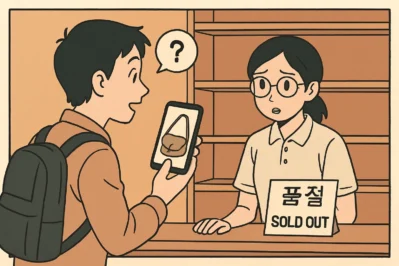Sold Out Again? How to Ask for Popular Items in Korean!
Hello! This is [Maeil Hangeul], here to upgrade your Korean skills!
Have you ever seen a K-pop idol wearing a cool accessory or a character in a K-drama eating a delicious-looking snack and thought, “I HAVE to get that!”? You rush to the store, but how do you ask if they even have it? Today, we’re going to learn the essential Korean phrases for asking if an item is in stock.
Lately in Korea, items featured by celebrities can sell out in minutes! This is a super useful lesson for anyone who wants to go shopping in Korea and grab those trendy items before they disappear. Let’s get started!
Core Expressions You MUST Know
Here are three simple but powerful expressions to help you on your shopping quest.
1. 이거 있어요? (Igeo isseoyo?)
* Pronunciation [Romanized]: I-geo iss-eo-yo?
* English Meaning: Do you have this? / Is this in stock?
* Detailed Explanation: This is the most basic and useful phrase for any shopper. 이거 (igeo) means “this,” and 있어요? (isseoyo?) means “do you have…?” or “is there…?” You can simply point to an item, a photo on your phone, or a display model and ask, “이거 있어요?” It’s a polite and universal phrase you can use in any store, from a convenience store to a department store.
2. 재고 (jaego)
* Pronunciation [Romanized]: Jae-go
* English Meaning: Stock, inventory
* Detailed Explanation: This is the specific word for “stock.” While “이거 있어요?” is a complete question, knowing the word 재고 (jaego) will help you understand the staff’s reply. They might say something like, “재고가 없습니다” (jaego-ga eopseumnida), which means “We are out of stock.”
3. 품절 (pumjeol)
* Pronunciation [Romanized]: Pum-jeol
* English Meaning: Sold out
* Detailed Explanation: This is the word you’ll see and hear when an item is completely gone. If an item is incredibly popular, you might see a sign on the shelf that says 품절 (pumjeol). It’s a very common word in the world of K-pop merchandise and viral fashion items. If you hear this word, it means you’re out of luck for now!
Example Dialogue in Action
Let’s see how these expressions work in a real conversation. Imagine you’re at a popular cosmetics store in Myeongdong.
- A (You): (Showing a picture of a popular lip tint on your phone) 안녕하세요. 혹시 이거 있어요?
(Annyeonghaseyo. Hoksi igeo isseoyo?)
(Hello. By any chance, do you have this?) -
B (Staff): 아, 그 틴트요! 잠시만요, 제가 재고 확인해 볼게요.
(A, geu tinteu-yo! Jamsimanyo, jega jaego hwaginhae bolgeyo.)
(Ah, that lip tint! One moment, I will check the stock for you.) -
B (Staff): (After checking) 죄송합니다. 그 색상은 어제 다 품절됐어요.
(Joesonghamnida. Geu saeksang-eun eoje da pumjeoldwaesseoyo.)
(I’m sorry. That color was completely sold out yesterday.) -
A (You): 아, 그렇군요. 알겠습니다. 감사합니다!
(A, geureokun-yo. Algesseumnida. Gamsahamnida!)
(Oh, I see. I understand. Thank you!)
Culture Tip & Trend Deep Dive
In Korea, there’s a phenomenon called “품절 대란” (pumjeol daeran), which translates to a “sold-out crisis” or “sold-out frenzy.” This happens when a celebrity, especially a member of a group like BTS or BLACKPINK, is seen using or wearing an item.
For example, when BTS’s Jungkook mentioned he drinks a certain brand of kombucha, it sold out nationwide for weeks! From luxury bags to simple snacks, anything can become a part of a “품절 대란.”
So, when you’re shopping in Korea, don’t be surprised if the item you want is 품절 (pumjeol). Knowing this word makes you sound like a true insider who understands modern Korean consumer culture!
Let’s Review and Practice!
Great job today! You’ve learned how to ask for items, understand replies about stock, and know the magic word for “sold out.”
- To ask for an item: 이거 있어요? (Igeo isseoyo?)
- The word for stock: 재고 (jaego)
- The word for sold out: 품절 (pumjeol)
Now, let’s test your knowledge!
1. Fill in the Blank: You are at a store and want to buy a hat you saw your favorite idol wear. You show a picture to the staff and say:
이 모자, ___________? (I moja, ___________?)
2. O/X Quiz: If a staff member tells you an item is “품절 (pumjeol),” it means you can buy it right now. (O / X)
What popular Korean item do you want to buy? Try leaving a comment below using the phrases you learned today






